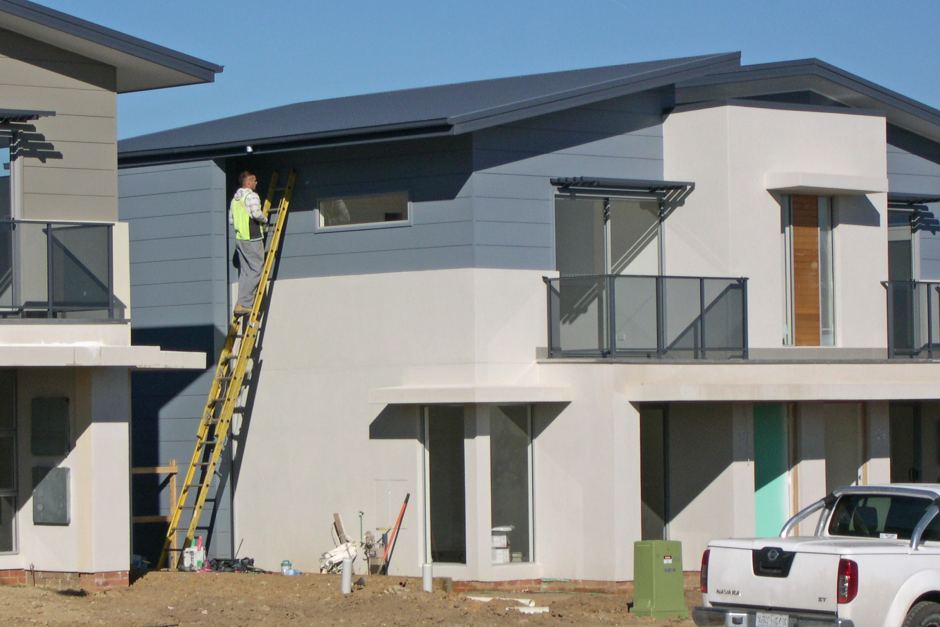Category: Economic Trends / Money and Monetary Policy
Interest rate rises needed to cool hot housing market: OECD
Tuesday, 29 Nov 2016 06:40:16 | Peter Ryan

Builder working on a town house (ABC News: Clarissa Thorpe)
Australians should brace for official interest rate rises by the end of next year to cool the hot real estate market, according to the OECD.
Key points:
- OECD predicts Australian interest rates will rise from late 2017
- Warns that "significant housing market concerns remain"
- Calls for tax reform, including GST and land tax
The Organisation for Economic Cooperation and Development warns monetary tightening is expected to begin towards the end of 2017 given the need to "unwind tensions" in the housing market caused by the record low interest rates.
"Monetary policy tightening is expected to commence towards the end of 2017 and this is appropriate given likely monetary policy developments elsewhere," the OECD said in its Global Economic Outlook released overnight.
The OECD's warning comes as some banks begin to increase standard variable rates for new borrowers independent of the Reserve Bank, while yields on safe government bonds begin to slowly rise eight years after the global financial crisis.
Market economists, who had been tipping the RBA's cash rate to stay lower for longer, are reviewing their forecasts with some still tipping another rate cut in 2017.
In a recent speech, Reserve Bank governor Dr Philip Lowe signalled the central bank's rate cutting cycle could be at an end.
The OECD made its concerns about rising real estate prices plain in its breakout on prospects for Australia's economy, while urging higher rates.
"Significant housing market concerns remain and there is growing discord between financial market developments and the rest of the economy due to the low interest rate environment," the OECD warned.
"The housing market remains a risk as an acceleration in price adjustment would weaken consumption demand and construction activity."
OECD urges land tax, GST increase
The OECD has also urged the Federal Government to pursue tax reform, repeating its calls for a review of the Goods and Services Tax (GST) and land tax.
However, Finance Minister Mathias Cormann this morning rejected the OECD's calls to put a review of the GST back on the agenda.
"We've had a debate in this country about the merits or otherwise of making changes to the GST and we've decided against it," Mr Cormann told ABC News Breakfast.
Rather than focusing too much on budget repair, the OECD said the Government should provide fiscal rather than monetary stimulus in the event of a downturn.
"There is space for fiscal loosening given the low public debt burden," the OECD observed.
"Returns would be high for accelerated infrastructure development and investing in skills, an area where Australia falls short."
The OECD predicted that Australia's economy will slow to below 3 per cent by the end of the year and that the jobless rate will rise slightly to 5.7 per cent before falling.
Follow Peter Ryan on Twitter @peter_f_ryan and on his Main Street blog.
- About Us
- |
- Terms of Use
- |
-
 RSS
RSS - |
- Privacy Policy
- |
- Contact Us
- |
- Shanghai Call Center: 962288
- |
- Tip-off hotline: 52920043
- 沪ICP证:沪ICP备05050403号-1
- |
- 互联网新闻信息服务许可证:31120180004
- |
- 网络视听许可证:0909346
- |
- 广播电视节目制作许可证:沪字第354号
- |
- 增值电信业务经营许可证:沪B2-20120012
Copyright © 1999- Shanghai Daily. All rights reserved.Preferably viewed with Internet Explorer 8 or newer browsers.




 Send to Kindle
Send to Kindle